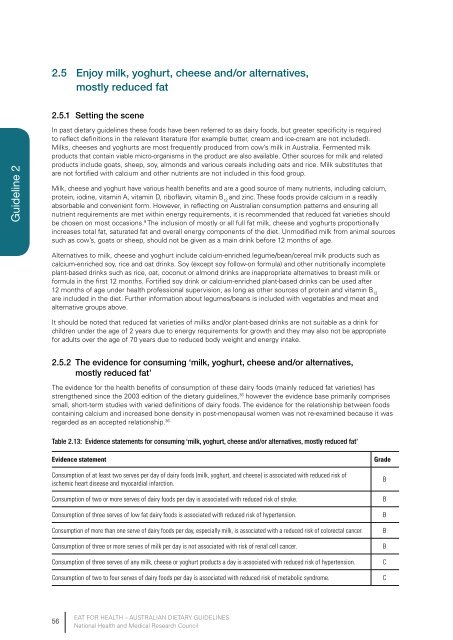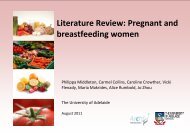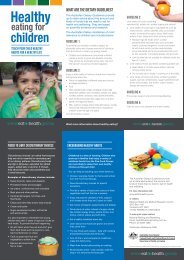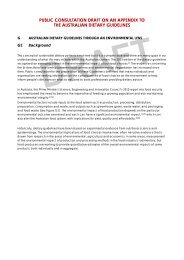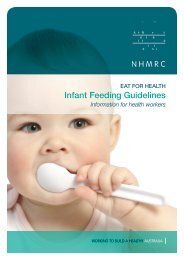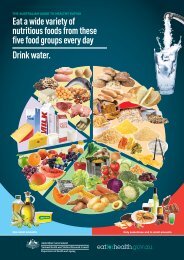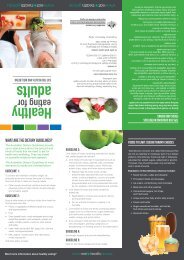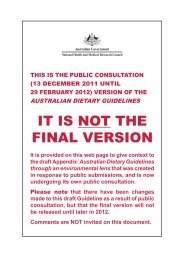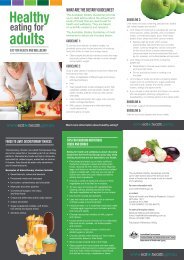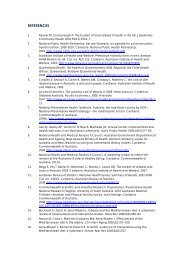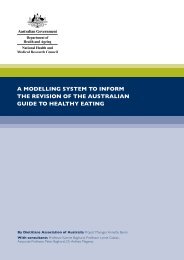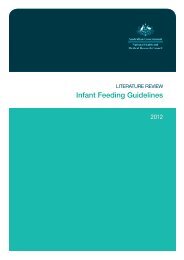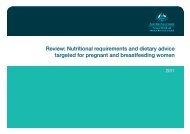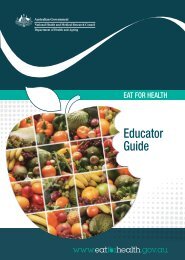Guidelines Dietary - Eat For Health
Guidelines Dietary - Eat For Health
Guidelines Dietary - Eat For Health
- No tags were found...
Create successful ePaper yourself
Turn your PDF publications into a flip-book with our unique Google optimized e-Paper software.
2.5 Enjoy milk, yoghurt, cheese and/or alternatives,mostly reduced fat2.5.1 Setting the sceneGuideline 2In past dietary guidelines these foods have been referred to as dairy foods, but greater specificity is requiredto reflect definitions in the relevant literature (for example butter, cream and ice-cream are not included).Milks, cheeses and yoghurts are most frequently produced from cow’s milk in Australia. Fermented milkproducts that contain viable micro-organisms in the product are also available. Other sources for milk and relatedproducts include goats, sheep, soy, almonds and various cereals including oats and rice. Milk substitutes thatare not fortified with calcium and other nutrients are not included in this food group.Milk, cheese and yoghurt have various health benefits and are a good source of many nutrients, including calcium,protein, iodine, vitamin A, vitamin D, riboflavin, vitamin B 12and zinc. These foods provide calcium in a readilyabsorbable and convenient form. However, in reflecting on Australian consumption patterns and ensuring allnutrient requirements are met within energy requirements, it is recommended that reduced fat varieties shouldbe chosen on most occasions. 9 The inclusion of mostly or all full fat milk, cheese and yoghurts proportionallyincreases total fat, saturated fat and overall energy components of the diet. Unmodified milk from animal sourcessuch as cow’s, goats or sheep, should not be given as a main drink before 12 months of age.Alternatives to milk, cheese and yoghurt include calcium-enriched legume/bean/cereal milk products such ascalcium-enriched soy, rice and oat drinks. Soy (except soy follow-on formula) and other nutritionally incompleteplant-based drinks such as rice, oat, coconut or almond drinks are inappropriate alternatives to breast milk orformula in the first 12 months. <strong>For</strong>tified soy drink or calcium-enriched plant-based drinks can be used after12 months of age under health professional supervision, as long as other sources of protein and vitamin B 12are included in the diet. Further information about legumes/beans is included with vegetables and meat andalternative groups above.It should be noted that reduced fat varieties of milks and/or plant-based drinks are not suitable as a drink forchildren under the age of 2 years due to energy requirements for growth and they may also not be appropriatefor adults over the age of 70 years due to reduced body weight and energy intake.2.5.2 The evidence for consuming ‘milk, yoghurt, cheese and/or alternatives,mostly reduced fat’The evidence for the health benefits of consumption of these dairy foods (mainly reduced fat varieties) hasstrengthened since the 2003 edition of the dietary guidelines, 36 however the evidence base primarily comprisessmall, short-term studies with varied definitions of dairy foods. The evidence for the relationship between foodscontaining calcium and increased bone density in post-menopausal women was not re-examined because it wasregarded as an accepted relationship. 36Table 2.13: Evidence statements for consuming ‘milk, yoghurt, cheese and/or alternatives, mostly reduced fat’Evidence statementConsumption of at least two serves per day of dairy foods (milk, yoghurt, and cheese) is associated with reduced risk ofischemic heart disease and myocardial infarction.Consumption of two or more serves of dairy foods per day is associated with reduced risk of stroke.Consumption of three serves of low fat dairy foods is associated with reduced risk of hypertension.Consumption of more than one serve of dairy foods per day, especially milk, is associated with a reduced risk of colorectal cancer.Consumption of three or more serves of milk per day is not associated with risk of renal cell cancer.Consumption of three serves of any milk, cheese or yoghurt products a day is associated with reduced risk of hypertension.Consumption of two to four serves of dairy foods per day is associated with reduced risk of metabolic syndrome.GradeBBBBBCC56EAT FOR HEALTH – australian dietary guidelinesNational <strong>Health</strong> and Medical Research Council


